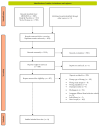Core Outcomes of Self-Care Behaviours in Patients with Breast Cancer Treated with Oral Anticancer Agents: A Systematic Review
- PMID: 39682191
- PMCID: PMC11640320
- DOI: 10.3390/cancers16234006
Core Outcomes of Self-Care Behaviours in Patients with Breast Cancer Treated with Oral Anticancer Agents: A Systematic Review
Abstract
Background/objectives: The use of oral anticancer agents (OAA) dates to the late 20th century in cancer treatment. It is crucial that patients implement self-care behaviours to keep their disease stable and manage their OAA treatment. The three dimensions of self-care according to Riegel et al., self-care maintenance, self-care monitoring, and self-care management, may be implemented to avoid negative outcomes. This paper seeks to identify outcomes associated with self-care in breast cancer patients during treatment with OAA and to compare which of these outcomes fall into the core outcome categorizations in oncology (minimal set of outcomes that research on a given health issue should measure).
Methods: A systematic review with narrative synthesis was conducted. This study included patients with breast cancer taking any kind of OAA and described outcomes of self-care. The search was performed on MEDLINE, Web of Science and CINAHL/PsycINFO; Results: Of 4173 records, eight studies were selected and reviewed. The core outcomes mainly considered were mortality, survival, disease recurrence and quality of life. All studies focused only on pharmacological adherence outcome; none of them focused on other dimensions of self-care.
Conclusions: This systematic review highlighted that there is a great lack of research on outcomes related to self-care in patients with breast cancer taking OOA. Even though pharmacological adherence to OAA is important, other behaviours are also important to improve patients' outcomes, but they have not been studied. Further research is needed to study how self-care behaviours can impact patients' outcomes.
Keywords: adherence; breast cancer; cancer; oral anticancer agents; outcome; self-care; self-management.
Conflict of interest statement
The authors declare no conflicts of interest.
Similar articles
-
Predictors of self-care in patients with cancer treated with oral anticancer agents: A systematic review.PLoS One. 2024 Sep 24;19(9):e0307838. doi: 10.1371/journal.pone.0307838. eCollection 2024. PLoS One. 2024. PMID: 39316559 Free PMC article.
-
Promoting and supporting self-management for adults living in the community with physical chronic illness: A systematic review of the effectiveness and meaningfulness of the patient-practitioner encounter.JBI Libr Syst Rev. 2009;7(13):492-582. doi: 10.11124/01938924-200907130-00001. JBI Libr Syst Rev. 2009. PMID: 27819974
-
Self-care behaviours in older adults treated with oral anticancer agents: A qualitative descriptive study.Eur J Oncol Nurs. 2022 Jun;58:102139. doi: 10.1016/j.ejon.2022.102139. Epub 2022 Apr 6. Eur J Oncol Nurs. 2022. PMID: 35489295
-
A Concept Analysis of Oral Anticancer Agent Self-management.Cancer Nurs. 2022 Mar-Apr 01;45(2):E374-E387. doi: 10.1097/NCC.0000000000000934. Cancer Nurs. 2022. PMID: 33654013 Free PMC article. Review.
-
Adherence to self-care behaviours and associated barriers in type 2 diabetes patients of low-and middle-income countries: a systematic review protocol.Syst Rev. 2017 Feb 27;6(1):39. doi: 10.1186/s13643-017-0436-4. Syst Rev. 2017. PMID: 28241863 Free PMC article.
References
-
- Leong C., Czaykowski P., Geirnaert M., Katz A., Dragan R., Yogendran M., Raymond C. Outpatient oral anticancer agent utilization and costs in Manitoba from 2003 to 2016: A population-based study. Can. J. Public Health = Rev. Can. De Sante Publique. 2021;112:530–540. doi: 10.17269/s41997-020-00464-6. - DOI - PMC - PubMed
Publication types
Grants and funding
LinkOut - more resources
Full Text Sources


